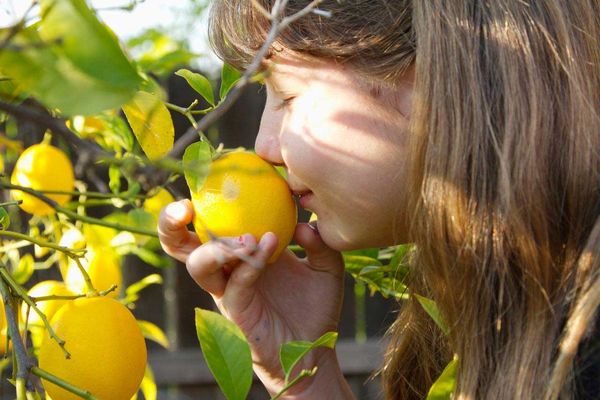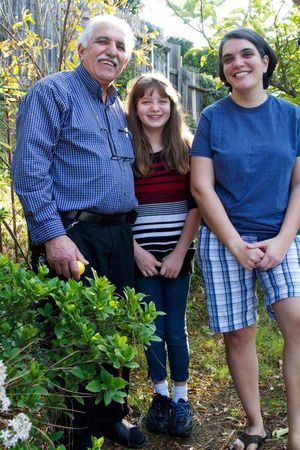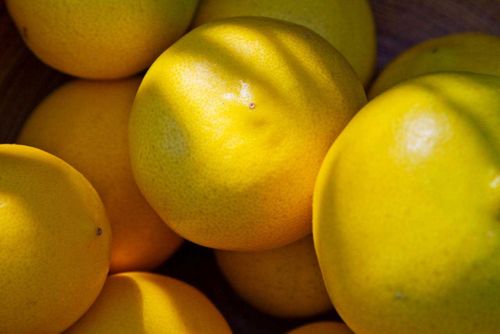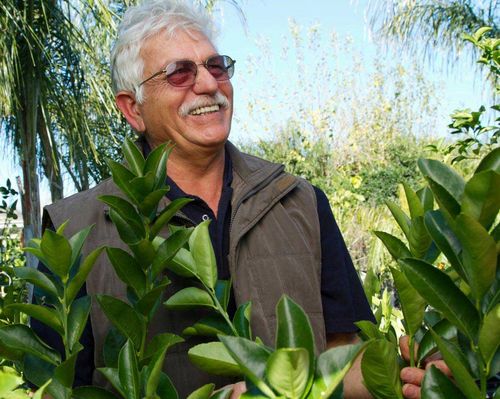http://latimesblogs.latimes.com/home_blog/2012/01/persian-sweet-lemon.html
Persian lemon trees, a sweetly scented treat
January 4, 2012 | 8:44 am
 Photo, top: Emily Taefi, 11-year-old granddaughter of Jamshid Taefi, takes in the scent of a
Photo, top: Emily Taefi, 11-year-old granddaughter of Jamshid Taefi, takes in the scent of a
Persian sweet lemon in her grandfather's garden in Diamond Bar.
Photo credit: Ann Summa
When she was 15, Azadeh Taefi started a seed from a store-bought Persian sweet lemon, limu shirin. It sprouted on the balcony of the familys apartment, but Taefi never expected it would bear fruit. That required grafting, her mom told her. Eight years ago Taefi's father, Jamshid, put the seedling into the ground behind their San Dimas house. With all-day sun, the plant flourished -- and began producing fruit after a few years. It started slowly but now delivers two harvests a year.
Also known as sweet lime, the fruit of the plant (botanical name Citrus limetta) is unlike the lemons or limes most people know. Its as sweet as an orange but without the acidity, and the greenish pulpy flesh exudes a bouquet of rose water, a flavor in the nose more than on the tongue. The fruit looks like a Meyer lemon, and when the thin rind is rubbed, it releases a sweet aroma. Around kitchen tables in Iran, it's ubiquitous from fall until spring, often used at any sign of a cold or cough. It turns sour within an hour of cutting, so it has to be fresh. Most people simply suck the juice from a cut section, sometimes with tea.
I eat it like an orange, the whole thing except the rind, Azadeh said.
Jamshid feeds his tree twice a year. Like most citrus in Southern California, his sweet lemon grows easily. But the owner of the Paradise Nursery in Chatsworth, Majid Jahanbin, said Persian sweet lemon trees grown from seed can thrive and be productive until hit with a fungus that splits the bark. Theres no cure, he said. A fungicide may slow down the disease, but the tree will die.
Thats why Persian sweet lemon trees are often sold grafted, he said, sometimes on the root stock of a sour orange. A grafted tree will yield fruit a year or so after its planted in the ground, and if kept happy the tree will live and produce fruit for decades.
Paradise Nursery also used to sell the Palestine sweet lime, similar in taste but with a stronger flavor. Like the Persian variety, its self-pollinating. The Persian sweet lemon has a longer blooming and fruiting period, however, so its more popular. Different cultures like different plants," Jahanbin said, shrugging and smiling.
-- Jeff Spurrier
 Jamshid Taefi with his granddaughter Emily
Jamshid Taefi with his granddaughter Emily
and daughter Azadeh at his San Dimas home.
 The Persian sweet lemons -- round with thin skin.
The Persian sweet lemons -- round with thin skin.
 Majid Jahanbin, owner of Paradise Nursery in Chatsworth, standing by Persian
Majid Jahanbin, owner of Paradise Nursery in Chatsworth, standing by Persian
sweet lemon trees that have been grafted onto root stock that is more resistant to disease. 










